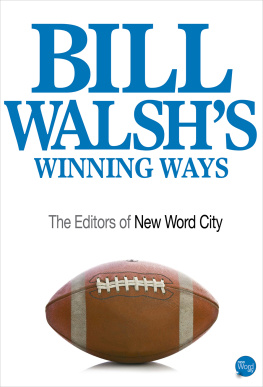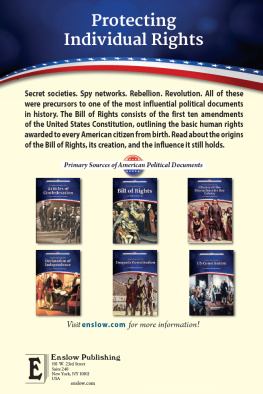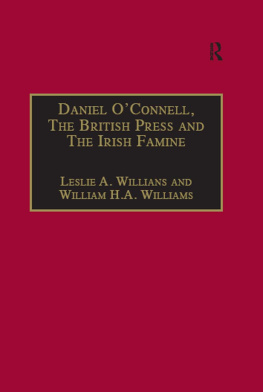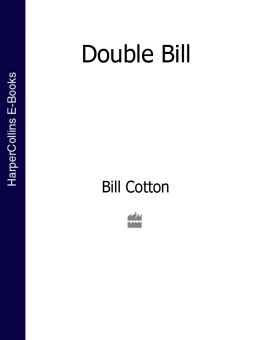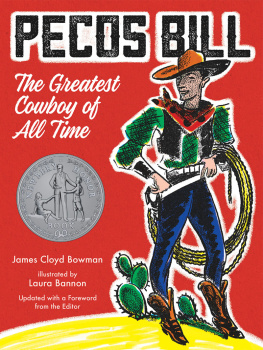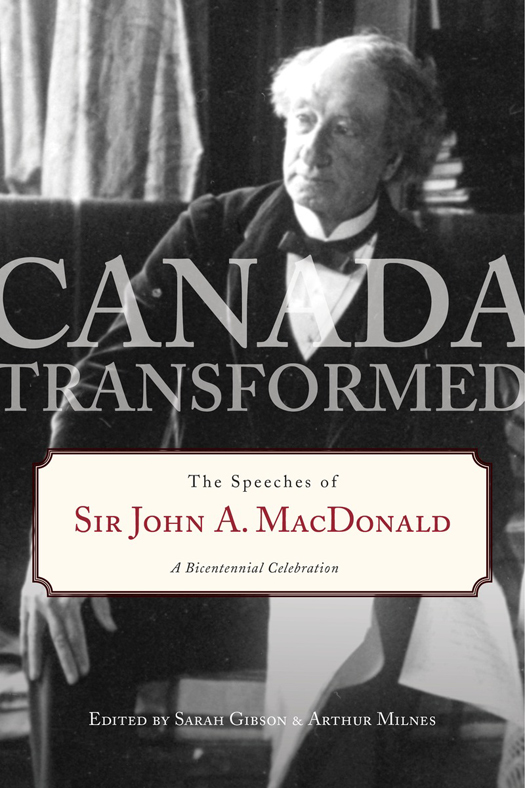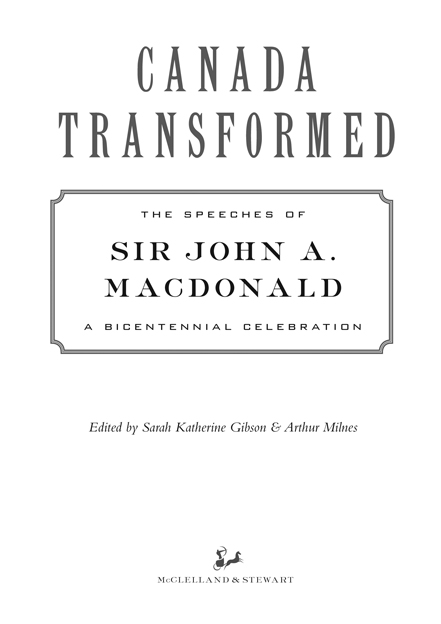Copyright 2014 by Sir John A. Macdonald Bicentennial Commission
All rights reserved. The use of any part of this publication reproduced, transmitted in any form or by any means, electronic, mechanical, photocopying, recording, or otherwise, or stored in a retrieval system, without the prior written consent of the publisher or, in case of photocopying or other reprographic copying, a licence from the Canadian Copyright Licensing Agency is an infringement of the copyright law.
Library and Archives of Canada Cataloguing in Publication is available upon request
Published simultaneously in the United States of America by McClelland & Stewart, a division of Random House of Canada Limited
Library of Congress Control Number available upon request
ISBN: 978-0-7710-5719-9
ebook ISBN: 978-0-7710-5720-5
Cover image: Sir John A. Macdonald, the Harold Daly Collections, Library and Archives Canada / c-002829
McClelland & Stewart,
a division of Random House of Canada Limited,
a Penguin Random House Company
www.randomhouse.ca
v3.1
CONTENTS
DIRECTORY OF KEY NAMES
POLITICAL UNITS OF SIR JOHN A. MACDONALDS CAREER (18441891)
THE UNITED PROVINCE OF CANADA (18411867)The Union Act of 1841 united the legislatures of Upper and Lower Canada, creating Canada West (Ontario) and Canada East (Quebec). The terms Upper and Lower Canada continued to be used after the union.
THE DOMINION OF CANADA (1867) The British North America Act of 1867 created the Dominion of Canada from Canada East, Canada West, Nova Scotia, and New Brunswick. It expanded during Macdonalds lifetime to include Manitoba (1870), British Columbia (1871), and Prince Edward Island (1873).
HEADS OF STATE THROUGHOUT SIR JOHN A. MACDONALDS CAREER (18441891)
UNITED PROVINCE OF CANADA
| TENURE | REIGNING MONARCH |
| 18371901 | Victoria, Queen of the United Kingdom of Great Britain and Ireland and Empress of India (18191901) |
| GOVERNOR GENERAL |
| 18431845 | Metcalfe, Charles Theophilus, 1st Baron Metcalfe (17851846) |
| 18461847 | Cathcart, Charles Murray, 2nd Earl Cathcart (17831859) |
| 18471854 | Bruce, James, 8th Earl of Elgin and 12th Earl of Kincardine (18111863) |
| 18541861 | Head, Sir Edmund Walker (18051868) |
| 18611867 | Monck, Charles Stanley, 4th Viscount Monck (18191894) |
DOMINION DF CANADA
| 18671868 | Monck, Charles Stanley, 4th Viscount Monck (18191894) |
| 18691872 | Young, Sir John, Baron Lisgar (18071876) |
| 18721878 | Blackwood, Frederick Temple, 1st Marquess of Dufferin and Ava (18261902) |
| 18781883 | Campbell, John George Edward Henry Douglas Sutherland, Marquess of Lorne and 9th Duke of Argyll (18451914) |
| 18831888 | Petty-Fitzmaurice, Henry Charles Keith, 5th Marquess of Lansdowne (18451927) |
| 18881893 | Stanley, Frederick Arthur, 1st Baron Stanley, and 16th Earl of Derby (18411908) |
FREQUENTLY MENTIONED NAMES
BALDWIN, ROBERT 18041858)
Leader of colonial reform in Canada West in the 1830s, he joined forces with Louis-Hippolyte La Fontaine and his French-Canadian reformers to push for responsible government. In 1843, they participated in a mass resignation from Lord Metcalfes ministry. In 1849, La Fontaine and Baldwin created a Reform Ministry, and Lord Elgin allowed their ministry to distribute patronage, thereby largely resolving the question of responsible government.
BLAKE, EDWARD (18331912)
An Upper Canadian lawyer and Reformer, Blake gained recognition for challenging the constitutionality of the double shuffle in 1858. In 1867 he ran in both provincial and federal elections, winning the seats for Bruce South and Durham West. He became premier of Ontario in 1871, and was a prominent voice in the provincial rights movement. He also served in Alexander Mackenzies federal Liberal government, but bitterly opposed its railway deal with British Columbia. He took a leading role in challenging Macdonalds franchise bill of 1885. In 1892, the Irish Nationalist party invited Blake to run for a seat in the British House of Commons, which he won.
BROWN, GEORGE (18181880)
After launching The Globe in 1844, Brown rose to prominence as an Upper Canadian politician on its success; by 1853 the newspaper was reputed to have the widest circulation in British North America. Brown entered the legislature of the United Province of Canada in 1851, and in 1853 put his weight behind the representation by population campaign and the sectarian interests of Protestant Ontario. His Two-Day Administration in 1858 with Antoine-Aim Dorion became the butt of jokes, but in 1864 he rose to prominence again as a member of the Great Coalition that sought the confederation of the British North American colonies. Brown retired from political life in October 1867.
CARTIER, SIR GEORGE-TIENNE (18141873)
Cartier was a French-Canadian businessman, lawyer, and politician deeply committed to economic progress for Canada East. In 1854 he became a minister in the United Province of Canada, making him the most influential politician among the moderate-Conservative Bleus. In 1858 he began promoting a British North American federation. After the idea gained support from the Colonial Office, he became part of the Great Coalition and of the Canadian delegation at the Confederation conferences. In 1868, he helped negotiate the acquisition of Ruperts Land and the North-West Territory. In 1871 he helped negotiate British Columbias entry into Confederation.
CARTWRIGHT, SIR RICHARD (18351912)
An Upper Canadian businessman, politician, and author from a prominent Loyalist family in Kingston, Cartwright entered politics in 1863 as a Tory, but by 1869 he had left the party. In 1873, he sat as an independent. His complete break with the Tories came during the Pacific Scandal and he formed strong ties with the Liberals. He gained office in Alexander Mackenzies government as minister of finance. He opposed the Conservatives National Policy tariff as anti-British, because it rejected free trade. After the defeat of the Liberals in 1878 he sat in opposition.
DORION, SIR ANTOINE-AIM (18181891)
A Lower Canadian lawyer, newspaperman, and politician, Dorion cut his political teeth in the turmoil of 1849, founding the Montreal Annexation Association, which called for Canadas annexation by the United States. By 1851, he was a prominent member of the Rouges, although he did not personally support the partys anticlericalism and radicalism. In 1854, he was elected to a seat in the legislature of the United Province of Canada, where he allied himself with George Brown, and they eventually formed the Two-Day Administration. However, Dorion opposed Browns project of the Great Coalition of 1864 and its aim of Confederation. Nevertheless, after Confederation he represented the ridings of Hochelaga and later Napierville in the House of Commons, where he helped renew and reconstruct the Liberal Party and promoted Wilfrid Lauriers career. He retired from politics in 1874 when he accepted the position of chief justice in Quebec.


